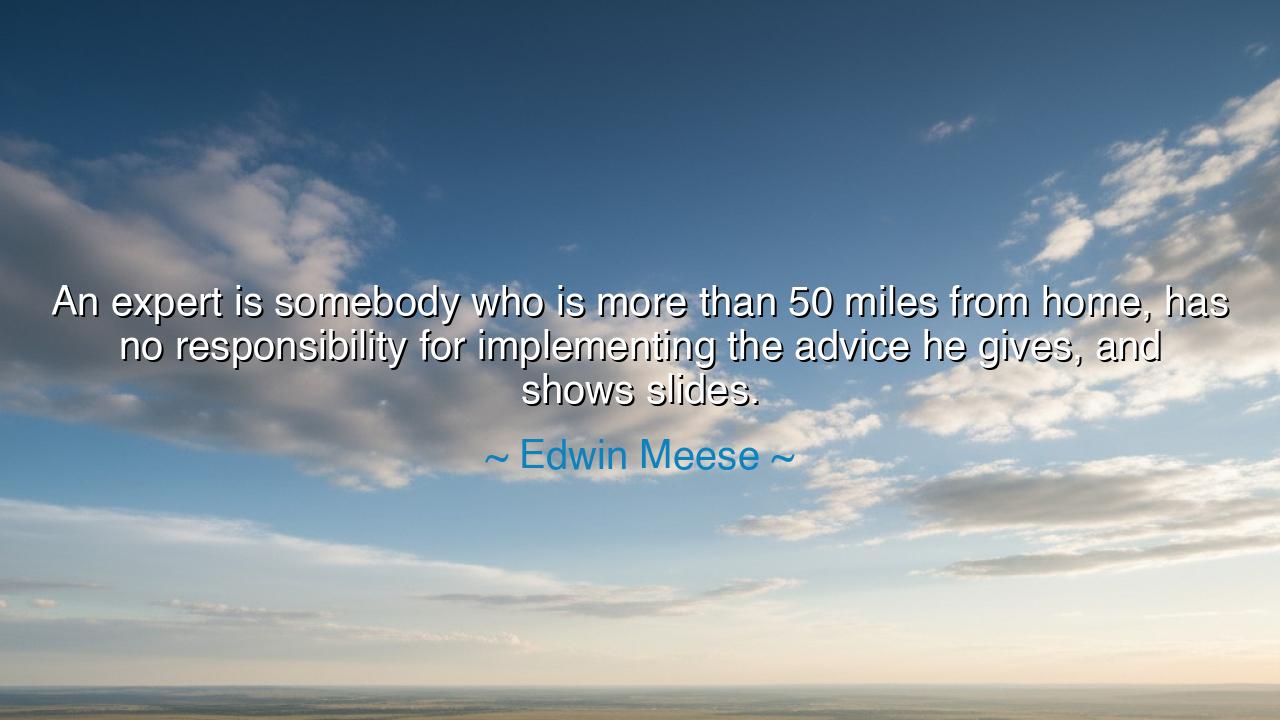
An expert is somebody who is more than 50 miles from home, has no
An expert is somebody who is more than 50 miles from home, has no responsibility for implementing the advice he gives, and shows slides.






“An expert is somebody who is more than 50 miles from home, has no responsibility for implementing the advice he gives, and shows slides.” — Edwin Meese
Behold this saying, sharp as the blade of irony and yet deep with truth. In it, Edwin Meese, a statesman of the modern age, reveals the timeless folly of human arrogance — the pretense of wisdom without the burden of consequence. His words speak of the expert, that figure who travels far from his homeland, adorned in credentials and polished words, who speaks boldly yet bears no scars of his own counsel. It is a jest on the surface, but beneath it lies a warning: wisdom divorced from experience is but an echo in an empty hall.
In ancient times, the elders spoke with reverence for those who had lived the truths they taught. The philosopher who had endured hardship, the general who had marched through dust and blood, the craftsman whose calloused hands proved his skill — these were the true sages. But Meese’s words remind us that in the modern world, many who claim expertise are travelers of theory, not of toil. They move from place to place, speaking of great solutions as if they were gods of intellect, yet when the storm comes, they stand apart, untouched by the wind.
Consider the tale of the Trojan War. Many wise men spoke to King Agamemnon of strategies and omens, but it was the soldier on the shore who bore the cost of those decisions. The kings and seers who debated in tents did not feel the weight of the spear nor the hunger of the siege. Their counsel was grand, but their responsibility was light. And so it has ever been — advice is easy when the heart does not pay for its consequences.
Yet Meese’s words are not spoken merely to mock the false wise man. They serve as a call to humility and authenticity. The true expert is not defined by the distance he travels, nor by the eloquence of his slides, but by his willingness to stand by his own counsel. To advise is to accept a share of the burden. To teach is to live what one teaches. Let not your wisdom be a garment worn for praise, but a skin that has known pain, failure, and triumph.
There was once a leader named Marcus Licinius Crassus, the richest man in Rome. In his pride, he believed himself an expert in war, though he had never truly led an army. Ignoring the advice of seasoned soldiers, he marched into Parthia — and his arrogance led to disaster. His legions were slaughtered, his empire shamed. Thus the gods remind us: knowledge without responsibility is ruin.
So, my child, when you speak, let your words be tempered by experience. When you advise another, imagine your own hands building what your lips propose. Never speak as one far from home, untouched by the soil of your own labor. Wisdom grows not from distance, but from nearness — from the closeness of sweat, error, and understanding.
The lesson is this: be the kind of expert who lives his truth. Let your knowledge serve, not dazzle. Let your actions prove your words. And when you are called to guide others, walk beside them, not above them. Show not slides that fade from memory, but deeds that endure through time. For in the end, it is not the clever talker who is remembered, but the doer — the one whose wisdom bore fruit in the world.






AAdministratorAdministrator
Welcome, honored guests. Please leave a comment, we will respond soon